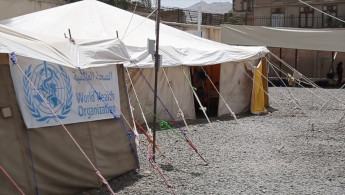UN warns cholera outbreak intensifying in Yemen
The United Nations on Monday expressed fears at what it called a "rapidly worsening" outbreak of cholera in war-ravaged Yemen, with more than 40,000 suspected cases since October, mainly in areas controlled by Houthi rebels.
"We are also deeply concerned about a rapidly worsening cholera outbreak. 40,000 suspected cases and over 160 deaths have so far been reported -- a sharp increase since our update last month," UN humanitarian chief Martin Griffiths said.
"The majority are in Houthi-controlled areas, where hundreds of new cases are reported every day," Griffiths told the Security Council.
In total, 34,000 suspected cases have been reported in those areas since October, more than three times the figure reported a month ago, according to data from the UN Office for the Coordination of Humanitarian Affairs (OCHA), run by Griffiths.
In comparison, 6,000 suspected cases have been reported in government-controlled areas.
"Heavy rains and flooding are expected to make things worse," Griffiths told diplomats, adding that the world body and its partners were taking "urgent action to stem the spread."
But he warned that the plan "will need rapid funding if we are to prevent the situation from spiralling out of control."
How the Houthis' alternative economy is worsening Yemen's humanitarian crisis ⬇ https://t.co/eZIjHMKZw9
— The New Arab (@The_NewArab) May 9, 2024
The UN's humanitarian response plan for Yemen for 2024, estimated to cost $2.7 billion, has only been funded by 16 percent so far.
"The consequences of inaction are of course familiar. Let us not forget that between 2016 and 2021, some 4,000 people in Yemen, mostly children, lost their lives to cholera," Griffiths said.
Yemen has been gripped by conflict since the Iran-backed Houthis overran the capital, Sanaa, in 2014, triggering the Saudi-led military intervention in support of the government the following year.
Hundreds of thousands have died in the fighting or from indirect causes such as a lack of food, according to the United Nations.
Hostilities slowed considerably in April 2022, when a six-month UN-brokered ceasefire came into effect, and they have remained at a low level since.





 Follow the Middle East's top stories in English at The New Arab on Google News
Follow the Middle East's top stories in English at The New Arab on Google News


